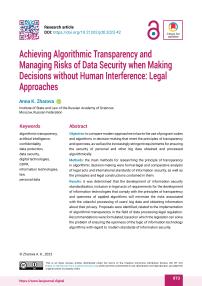Achieving Algorithmic Transparency and Managing Risks of Data Security when Making Decisions without Human Interference: Legal Approaches
Автор: Zharova A. K.
Журнал: Journal of Digital Technologies and Law @lawjournal-digital
Статья в выпуске: 1 (4), 2023 года.
Бесплатный доступ
Objective: to compare modern approaches in law to the use of program codes and algorithms in decision-making that meet the principles of transparency and openness, as well as the increasingly stringent requirements for ensuring the security of personal and other big data obtained and processed algorithmically. Methods: the main methods for researching the principle of transparency in algorithmic decision-making were formal-legal and comparative analysis of legal acts and international standards of information security, as well as the principles and legal constructions contained in them. Results: it was determined that the development of information security standardization, inclusion in legal acts of requirements for the development of information technologies that comply with the principles of transparency and openness of applied algorithms will minimize the risks associated with the unlawful processing of users’ big data and obtaining information about their privacy. Proposals were identified, related to the implementation of algorithmic transparency in the field of data processing legal regulation. Recommendations were formulated, based on which the legislator can solve the problem of ensuring the openness of the logic of information technology algorithms with regard to modern standards of information security. Scientific novelty: it consists in the substantiation of new trends and relevant legal approaches, which allow revealing the logic of data processing by digital and information technologies, based on the characterization of European standards of the “privacy by design” concept in new digital and information technologies of decision-making and data protection, as well as on the new legal requirements for artificial intelligence systems, including the requirement to ensure algorithmic transparency, and criteria for personal data and users’ big data processing. This said, data protection is understood as a system of legal, technical and organizational principles aimed at ensuring personal data confidentiality. Practical significance: it is due to the need to study the best Russian and international practices in protecting the privacy of users of digital and information technologies, as well as the need for legislative provision of requirements for the use of algorithms that meet the principles of transparency and openness of personal data processing, taking into account the need to ensure confidentiality at all stages of the life cycle of their processing, which will ensure the continuity of security management.
Algorithmic transparency, artificial intelligence, confidentiality, data protection, data security, digital technologies, GDPR, information technologies, law, personal data
Короткий адрес: https://sciup.org/14128455
IDR: 14128455 | УДК: 34:004:346.1:006.44:004.8 | DOI: 10.21202/jdtl.2023.42


